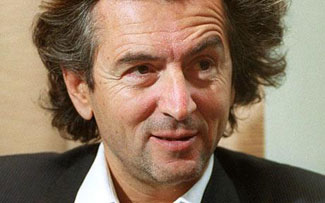 |
When
Angelina Jolie asked me to join her in presenting the avant-premiere
of her film, In the Land of Blood and Honey, I began, of course, by
asking to view it. But once I had, I did not hesitate for a second.
Because, really, what a story!
Here is a great Hollywood actress.
Here is one of the most popular and famous stars
of cinema in the entire world.
Here is a great name, and no one could doubt that
the day she decided to go behind the camera, she would have an
unlimited choice of subjects, of financing, of scenarios, and, of
course, of actors beating the path to her door for the privilege of
participating in the adventure. |
But one day Angelina Jolie, indeed, goes behind the camera -- and
what happens?
She shoots a film d'auteur, with unknown Bosnian
actors, in a language, Bosnian, that seems improbable both in
America and in Europe -- and the film is set in this blind spot of
20th century history, in this moment of utter sorrow, one of
indignity and shame, too, for the nations that let it happen: the
Bosnian war.
The result is a film that, first of all, rings
unbelievably true. I know the places she evokes. I saw, in real
life, the men and women who resemble Danijel and Aila, the Romeo and
Juliet of this love story set against a backdrop of concentration
camps and horror, like brothers and sisters. And this affair of rape
as a weapon of war, this humiliation of a people through the
tortured bodies of its women, this ethnic purification via the belly
that is, not the décor, but the subject of the film, I filmed it in
Bosna!, my 1994 documentary. Well, the fiction she has based upon
these tragedies, their reconstitution nearly twenty years later in
the Hungarian studios, their presentation in script, scene, and
caption, are strikingly true to life and recapture the breath, the
dark violence, that were the mark of a reality that, unhappily, I
can confirm.
The result is a rare and very moving case of a
successful transmission. Angelina Jolie was an adolescent at the
time of the events she relates. She was only aware of them through
vague hearsay, no doubt well after the fact. At the time when a mere
handful of her elders (Peter Schneider and Hans Christoph Buch in
Germany; Salman Rushdie in England; Christopher Hitchens or Susan
Sontag in the United States; the author of these lines, and a few
others, in France) feared that Sarajevo marked the tolling of the
bell for a Europe had just offered the 21st century its new and no
less nightmarish Spanish Civil War, she was still dreaming about her
roles in Glass Shadow? and Hackers. But she has taken over, picked
up the torch, continued in a sense the struggle and, not content to
relive what we lived through, accomplished the miracle, always
overwhelming when it happens, of turning our memory into history.
And the result is, ultimately, a political act
such as the cinema engenders with increasing rarity. A politically
committed film? Partial? A film that does not hesitate to do battle
and take the risk, when necessary, of being accused of Manicheism by
the cretins? Yes, of course. For it's a film that calls a spade a
spade. A film that, far from the braying unanimity one imagines a
pure creation of the Hollywood industry might inspire, calls the
members of the Serb militias of the era "fascists" and takes care to
distinguish, in the confusion of those sombre days, victims and
executioners. And a film that, as a result, to borrow Godard's
expression, is not just a film, but a just film, rendering justice
to the dead and honor to the survivors.
When In the Land of Blood and Honey was shown in
Sarajevo, on the eve of its presentation in Paris, it was welcomed
by a crowd that vacillated for long moments between tears and
cheering. Normal. Consider the violated women who have remained
silent for the past twenty years. The children of those rapes, who
are now becoming adults, who have born their genetic burden like a
disgrace. Consider this Bosnian society that beheld, there, its most
painful secret. Here is, suddenly, a great actress, and a great lady
as well, who has used her prestige so that, for the first time, they
might be allowed to raise their downcast heads.
I witnessed a similar situation, forty years ago,
in Bangladesh, when a Muslim chief of State, President Mujibur
Rahman, made the courageous decision to declare birangona --
literally, national heroines -- the dozens of thousands of young
women who had been raped by the ruffian soldiers of the Pakistani
army and who, for that, had been outcasts not only of society but
often of their own families as well. This, mutatis mutandis, is the
gesture of Angelina Jolie. And it is what makes the sombre grandeur
of her film.
Our paths had crossed once earlier, in connexion
with the memory of Daniel Pearl, whose widow she portrayed in a
film.
And then a second time, on February 25th, 2007, at
Bahai, in the north Sudan, where I was waiting for the possibility
of clandestine passage to Darfur, and where she had come to visit
the refugee camps.
This third meeting is the best -- at the encounter
of a suffering that knows no statute of limitations and its
inscription in the register of a work of art. |
